
At SpeedX Marketing, we are a leading provider of innovative IT solutions tailored to meet your specific business needs. With years of expertise and a team of skilled professionals, we offer cutting-edge technology solutions that drive growth and efficiency.




Franchise SEO plays a critical role in bridging the gap between local visibility and national brand presence. While we often associate franchises with massive global chains, the reality is that 80% of franchises are local or regional brands, with only 16% being national or global names. This makes local SEO for franchises a unique challenge, far different from general local SEO for standalone businesses.
Unlike traditional businesses that focus on a single location, franchises must balance the overall brand image while optimizing for individual locations. Franchise SEO involves tailored strategies like Google My Business (GMB) optimization, localized content creation, and citation building—all aimed at ensuring each franchise location ranks high in its specific geographic area.
Why is this so important? Studies show that over 70% of consumers who perform a local search visit a store within five miles. For franchises, this means that appearing in local search results can directly impact foot traffic, conversions, and revenue. By implementing precise local SEO techniques, franchises can effectively connect with customers actively searching for their products or services nearby, enhancing both visibility and credibility.
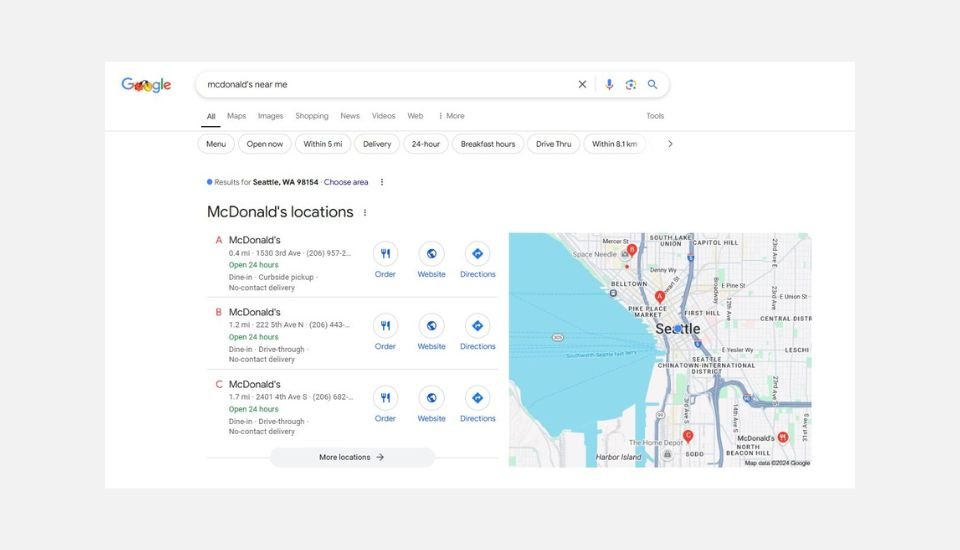
Ever searched ‘McDonald’s near me’ and seen locations just 0.4, 1.2, or 1.7 miles away? That’s the power of franchise local SEO—optimizing each location to dominate local search results and connect with customers nearby!
Local business SEO and franchise SEO both aim to enhance visibility in local search results, but they operate under different dynamics and strategies due to their unique business structures. Understanding these differences is crucial for optimizing their online presence effectively.
Local businesses typically begin with limited brand recognition, necessitating the establishment of credibility within their community through extensive local engagement, fostering local backlinks, and cultivating positive reviews. Their focus is on creating a robust local presence that resonates deeply with nearby customers. In contrast, franchises leverage their well-known brand identities and often benefit from extensive national or international marketing efforts, providing them with a significant advantage when entering new local markets.
In the realm of local SEO for franchises, the approach to SEO strategies differs notably between local businesses and franchise operations. Local businesses enjoy complete autonomy over their SEO tactics, enabling them to finely tune marketing efforts and website content to resonate deeply with local preferences and swiftly adapt to evolving market dynamics and customer feedback. In contrast, franchise SEO requires franchisees to adhere closely to overarching brand guidelines established by the franchisor. While there’s room for localized marketing adjustments, maintaining consistent brand messaging across all locations is paramount. This balance helps keep the brand consistent, but it can sometimes make it hard for franchise owners to use specific SEO strategies that work best for their local market and unique customer needs.
The changing world of local SEO brings both challenges and chances for franchises. Unlike small local businesses that mainly compete nearby, franchises operate in a more complex environment. While being part of a well-known brand helps, dominating locally requires a smart approach that shows how relevant they are in each community.
This approach relies on carefully using local SEO tactics. Franchises need to focus on using the right keywords that match what their local customers are searching for. It’s also important to keep their business name, address, and phone number consistent and correct across all online places to help search engines find them easily. Building a good reputation through positive customer reviews is crucial too, as it helps gain trust and makes them more visible locally.
By mastering these aspects of local SEO, franchises can make sure they catch the eye of nearby customers looking for their products or services. This helps them become leaders in local search results.
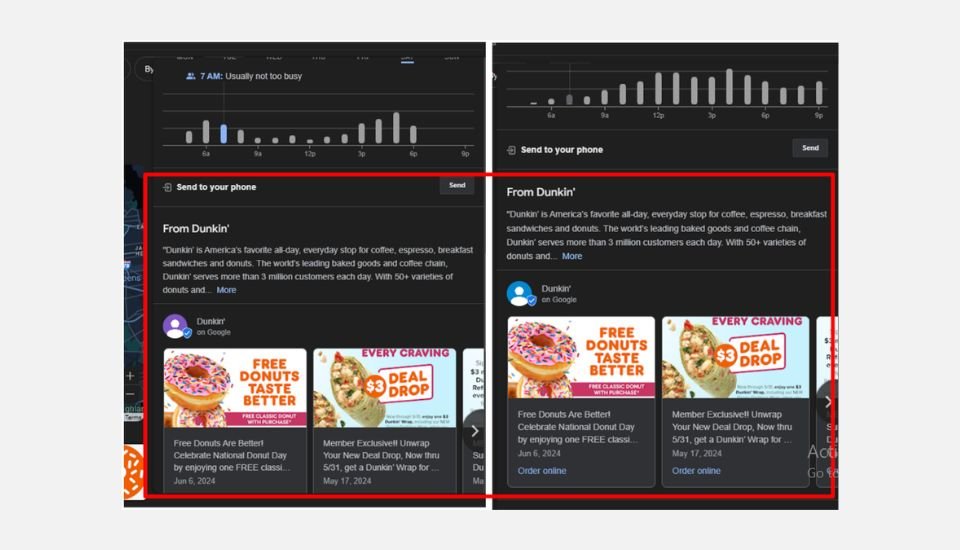
When comparing Dunkin’ locations from different areas, we found identical descriptions and updates. This consistency may lead to thin content due to franchise policies that limit individual adjustments. This poses a challenge for franchises striving to tailor unique content to local markets.
With the advantage of access to sophisticated SEO tools and resources provided by the franchisor, franchise SEO stands apart from local businesses who often rely on more basic tools due to limited budgets. Franchises leverage advanced tools for position tracking, competitor analysis, and review management, enabling them to craft robust local SEO strategies. This comprehensive approach not only enhances their online visibility but also allows them to effectively compete in local markets, surpassing the capabilities of smaller businesses. By harnessing these resources, franchises can strategically align national branding with localized marketing efforts, ensuring a consistent and impactful presence that resonates with local audiences.
While both local businesses and franchises aim to dominate local search results, their approaches and strategies differ significantly due to their business structures and resources. Local businesses focus on building their reputation and visibility within their community, while franchises leverage their established brand recognition and resources to gain a competitive edge in local markets. Understanding these differences allows each to tailor their SEO efforts to maximize their effectiveness and reach their target audiences more efficiently.
For franchises, effectively managing online presence across multiple locations is vital for maintaining brand consistency and improving local SEO. Each franchise location should be listed on Google Business Profile to enhance visibility and attract local customers. Let’s explore the key strategies for listing franchise locations, ensuring consistent branding, and leveraging an example of a successful franchise in New York.
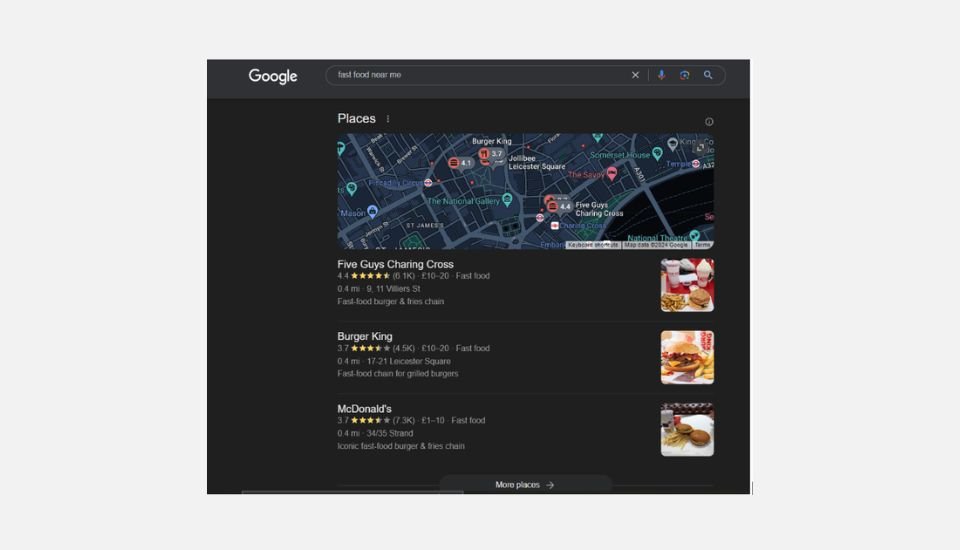
Searching ‘fast food near me’ in London? The top three results are all from well-known food franchises! This highlights the crucial role of listing your franchise on Google Business Profile. Ensure your business stands out, attracts more local customers, and boosts visibility by leveraging this powerful tool.
To start, every franchise location must have a Google Business Profile listing to appear on Google Maps and in local search results. Here’s a step-by-step approach to accomplish this:
Consistent branding across all franchise locations is crucial for building a strong, unified presence in local search. All locations must share the same primary category that best represents the franchise. For example, all “Starbucks” locations should use “Coffee Shop” as the primary category. Consistency in categories helps Google recognize the business type and improves search accuracy. Use consistent logos, color schemes, and descriptions across all profiles. This not only reinforces brand identity but also helps customers identify the franchise easily in search results.
A practical example of effective management of Google Business Profiles is Dunkin’ Donuts in New York. Dunkin’ has numerous locations across the city, each listed individually on Google Business Profile.
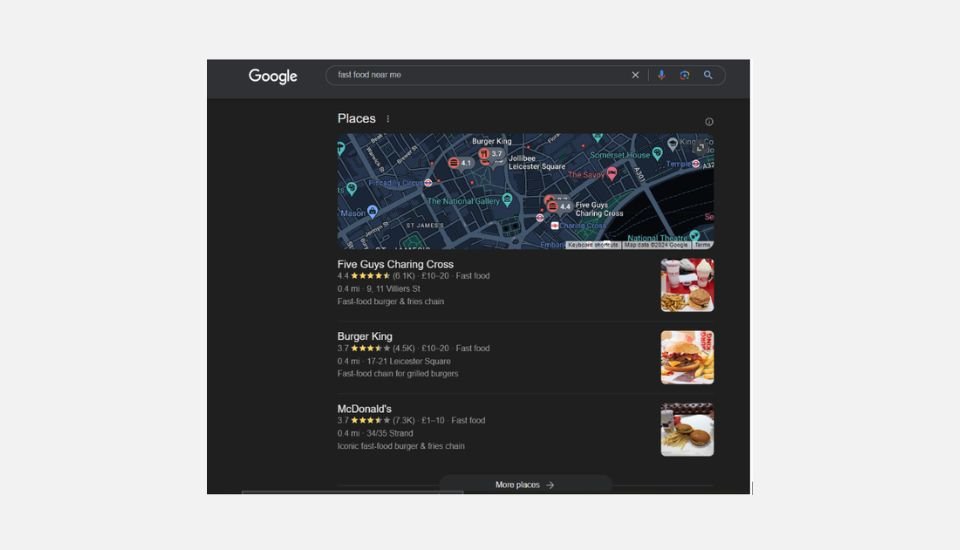
Here’s how they maintain consistent branding and manage multiple profiles:
Consistent Naming: All locations are listed simply as “Dunkin’” to maintain a uniform brand identity, avoiding any variations that could confuse customers.
Accurate Categories: Every location is categorized under “Coffee Shop” and “Donut Shop,” ensuring that customers searching for these services can easily find a Dunkin’ location nearby.
Local Engagement: Each Dunkin’ profile includes localized details like specific services available at that location, special promotions, and unique features such as drive-thru availability or extended hours.
For franchises with multiple sub-brands or unique naming conventions, Google allows for some flexibility. For instance, a business like Nordstrom, which operates both “Nordstrom” and “Nordstrom Rack,” can list each under its respective name. Similarly, businesses with different types of services at various locations can adjust their profiles to reflect those differences accurately.
For franchises that operate virtual brands or multiple brands at a single location, it’s crucial to manage each brand’s profile separately. For example, if a location houses both “KFC” and “Taco Bell,” each should have its own profile rather than a combined one. This separation prevents confusion and ensures each brand gets proper representation in local searches.
It’s essential to keep each profile up-to-date with any changes in business hours, services, or contact details. In case of rebranding, Google allows for updating the business name if the core identity remains unchanged, like changing “Staples Office Supplies” to “Staples.”
By following these strategies, franchises can effectively manage their online presence, maintain consistent branding across locations, and leverage Google Business Profile to enhance visibility and attract local customers. This approach not only boosts local SEO performance but also ensures a unified brand experience across all franchise locations.
Adding all franchise locations to various local directories is crucial for boosting visibility and credibility. Local directories such as Yelp, Google Business Profile, and others are trusted by consumers for finding and choosing businesses. Here’s an in-depth look at why adding each franchise location to different local directories is essential, with a focus on renowned local listing directories and the importance of maintaining NAP (Name, Address, Phone Number) consistency.
Franchises compete with small businesses in local search based on three key ranking factors: distance from the user, online prominence, and search query relevance. These factors determine how prominently a business appears when someone searches locally. Local SEO levels the playing field by enabling franchises to establish robust local visibility and compete for organic traffic more effectively. Adding franchise locations to prominent local directories like Yelp, Google Business Profile, and others is crucial for several reasons:
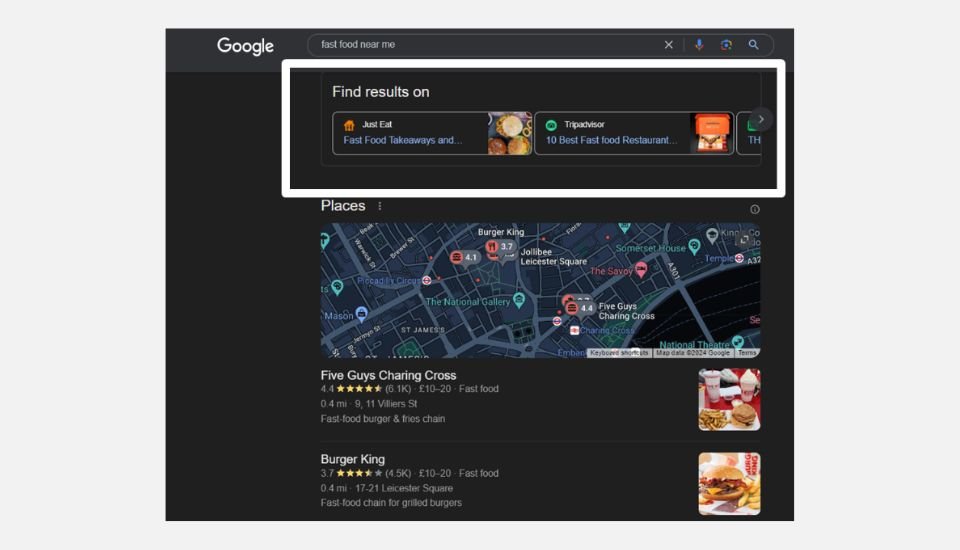
Searching for “fast food near me” in London? Google prioritizes directory listings before local map packs and organic results—making it essential for your franchise to be listed on local directories. Don’t miss out on the visibility and traffic it brings
NAP, which stands for Name, Address, and Phone Number, must be consistent across all local directories for several reasons. First, search engines like Google rely on consistent NAP information to verify the legitimacy of a business. Inconsistent NAP details can confuse search engines, leading to lower rankings or misdirected search results. Second, consistency in NAP information builds customer trust by ensuring that potential customers receive accurate information, which enhances their experience with the franchise. Third, inconsistent NAP details can lead to duplicate listings on directories, confusing both customers and search engines, and potentially splitting reviews and lowering the overall ranking of the business. Lastly, consistent NAP details simplify the process of updating information across platforms, ensuring smooth transitions if changes such as a new phone number or address are needed. Listing all franchise locations in various local directories is essential for maintaining strong local visibility, enhancing SEO, and building credibility. Trusted directories like Yelp, Google Business Profile, Bing Places, Facebook, and TripAdvisor provide platforms for franchises to engage with local customers and receive valuable feedback, making consistent NAP information crucial for easy discovery and trust.
Yelp is a top-rated review site that helps people find and compare businesses. It’s crucial for franchises because it allows each location to have its own profile, complete with customer reviews, hours, contact details, and photos. Not listing all franchise locations on Yelp could mean missing out on local customers who are actively searching for services or products nearby.
Bing Places works similarly to Google Business Profile but targets users who prefer Bing for their searches. It provides another avenue for potential customers to find franchise locations, making it an important listing for comprehensive local SEO coverage.
Listing your law firm directory on Justia is a strategic move, especially if you have law firm franchises. Justia is renowned for its comprehensive legal directory, enhancing your firm’s visibility and credibility. By ensuring your franchise details are accurately listed, you can attract more clients and improve your search engine rankings. Justia’s platform allows potential clients to find and trust your services easily, making it an essential tool for any law firm franchise looking to grow and succeed.
Facebook‘s local business pages allow franchises to connect with local audiences. Each location can have its own page where it shares updates, engages with customers, and responds to reviews. Given Facebook’s massive user base, this can be a powerful tool for local visibility and customer interaction.
TripAdvisor is for franchises in the hospitality or service industry, TripAdvisor is vital. It allows users to read reviews, see photos, and find detailed information about each location. Listings on TripAdvisor can attract tourists and locals alike, making it an essential directory for franchises in relevant sectors.
Local keyword research for franchise websites involves identifying the most relevant and high-impact keywords that will help each franchise location rank well in local search results. This process can be more complex than for a single-location business due to the need to account for multiple geographic areas and local nuances. Here are detailed steps and unique points specific to franchises:
Each franchise location has unique characteristics and local customer behaviors. To effectively target your local audience, you need to understand the following aspects:
For franchises, combining service keywords with location modifiers is crucial to effectively target local customers. This approach helps each franchise location rank higher in local search results, attracting more relevant traffic.
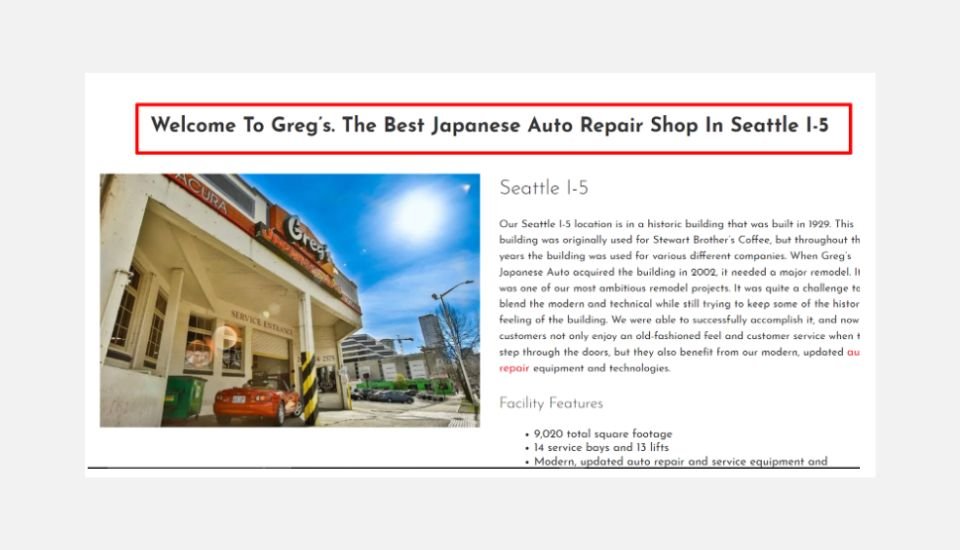
Primary Keywords: involve combining the main service with the city or neighborhood. For instance, if your franchise offers pizza delivery, a primary keyword could be “pizza delivery in Glasgow G52.” This specific keyword targets customers searching for pizza delivery services within that particular postal code, making your franchise more visible to potential customers in the area. Using such precise keywords increases the chances of appearing in local search results, which is especially important for attracting nearby customers.
Secondary Keywords: go a step further by incorporating neighborhood-specific terms, nearby landmarks, or local slang. For example, “pizza near Paisley Road West” adds more specificity and relevance. Local customers familiar with the area are more likely to use these terms when searching, increasing the likelihood of your franchise appearing in their search results. Additionally, understanding and using local slang or colloquial terms can create a sense of familiarity and trust with the community, enhancing customer engagement.
Incorporating competitor analysis into your keyword strategy is also essential. Identify what keywords your local competitors are using by examining their website content, meta tags, and search engine performance. Tools like SEMrush, Ahrefs, or SpyFu can help you gather this data. By understanding the keywords your competitors are targeting, you can identify gaps and opportunities in your own strategy. For example, if competitors are focusing heavily on “fast pizza delivery in Glasgow,” you might find success targeting a slightly different angle, like “best gourmet pizza in Glasgow G52” or “family-friendly pizza restaurant near Paisley Road West.”
By using location-specific keywords and integrating competitor insights, franchises can develop a comprehensive and effective keyword strategy that enhances local visibility and attracts more customers to each specific location.
Conducting an individual location analysis is essential for each franchise, treating each one as an independent entity for keyword research. Start by utilizing Google My Business Insights to determine the specific keywords people use to find each location. Then, use tools like Google Keyword Planner or Ubersuggest to identify the search volumes for these location-specific keywords, ensuring you’re targeting terms with substantial local interest. Additionally, directly engage with local customers through surveys to understand how they found the business online, uncovering commonly used search terms and phrases. This tailored approach helps each franchise optimize its local SEO strategy effectively.
Optimizing a website for a franchise business involves several key strategies to ensure that each location performs well in local searches and maintains brand consistency. Here are some actionable steps to optimize your franchise website effectively:
For a franchise business, having location-specific landing pages is essential for optimizing local search visibility and providing a tailored user experience. Each franchise location should have its own dedicated page that is specifically designed to cater to the local market.
It’s crucial to display the local address and contact information clearly on each landing page. This not only helps potential customers find the location easily but also enhances local SEO. For instance, if you run a clothing store chain, each store’s landing page should feature the store’s exact address, phone number, and possibly even an embedded Google Map for easy navigation.
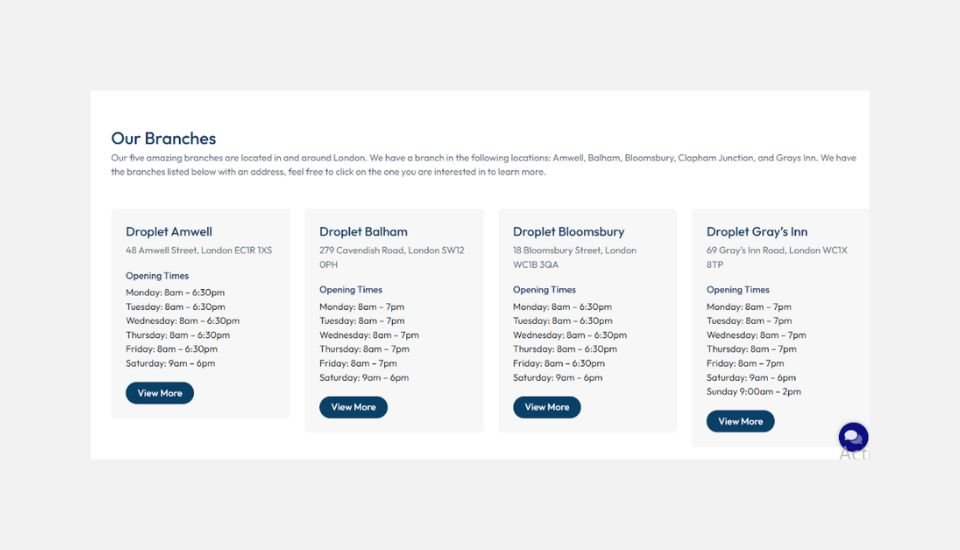
Highlight the products or services that are unique to each location. For a law firm with multiple branches, each landing page could outline the specific legal services offered at that branch. For example, a branch in one city might specialize in family law, while another might focus on personal injury cases. Similarly, a clothing store chain could emphasize seasonal collections or local promotions specific to each store’s location.
Including reviews and testimonials from customers in that area can greatly enhance credibility and trust. For instance, a clothing store might feature testimonials from local customers who have praised the store’s selection or customer service. A law firm could showcase client testimonials that highlight successful cases or positive experiences with the branch’s attorneys.
Consider a clothing store chain with locations across various cities. Each store should have its own landing page, such as “Stylish Apparel in Downtown Chicago” or “Trendy Outfits in South Miami.” These pages would include details about the store’s offerings, local sales or events, and customer reviews specific to that location.
For a law firm, each branch might have pages like “Experienced Divorce Attorneys in San Francisco” or “Top Personal Injury Lawyers in Dallas.” These pages would provide information on the legal services offered, client testimonials from that particular city, and contact details for the branch office.
Creating these localized landing pages ensures that each franchise location is effectively represented online and can attract and serve local customers more efficiently.
To make your website content relevant to the local audience, focus on writing local blog posts, creating location-based guides, and spotlighting local success stories. Local blog posts can cover articles about local events or news related to your business, helping to engage the community and improve local SEO. Location-based guides provide valuable tips and information specific to your area, positioning your business as a local authority. Spotlighting success stories or case studies from local customers builds trust and showcases real-life benefits of your products or services. For instance, a fitness franchise could write a blog post titled “Top 5 Running Trails in San Diego,” offering useful insights for local runners, or “How Our Portland Gym Supports Local Athletes,” highlighting community involvement and customer achievements.
Schema markup is a powerful tool that helps search engines understand the content of your web pages better, making it easier to display relevant information in search results. Although schema markup does not change the appearance of your website, it plays a crucial role in enhancing your search visibility by enabling rich results, which can include additional details such as business locations, reviews, and contact information.
Schema markup, often referred to as structured data, is a type of code added to your website that provides search engines with explicit information about your business. This code helps search engines interpret and display your content more accurately in search results, which can lead to improved visibility and higher click-through rates. For local businesses, applying schema markup is particularly important because it ensures that location-specific information is clearly communicated to search engines, thereby improving local search performance.
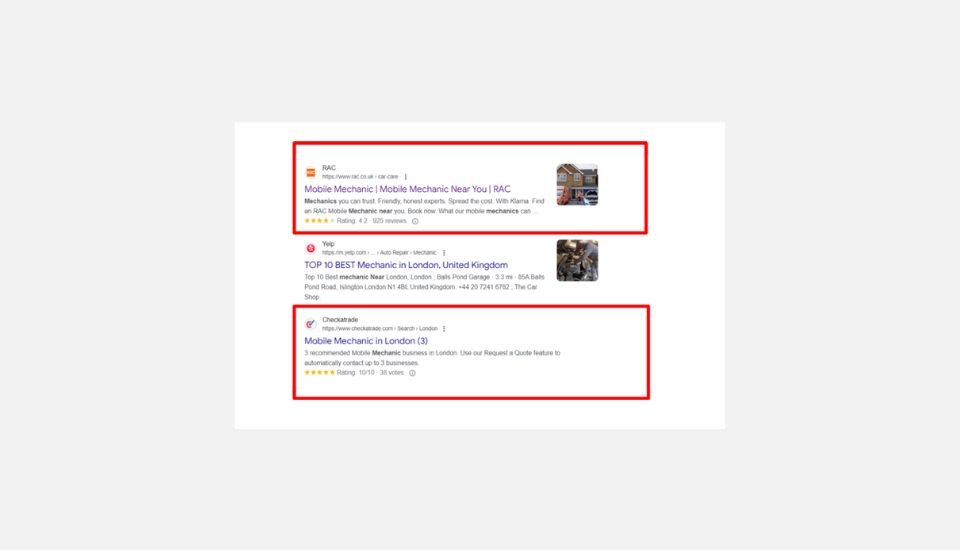
To implement local schema markup for your franchise website, focus on the following key areas:
By effectively using location-specific schema markup, franchises can significantly improve their local search performance, leading to better visibility, increased trust, and more leads from potential customers.
Link building is a critical component of SEO, involving the acquisition of backlinks from other websites to your own. These backlinks help to boost your site’s authority and search engine ranking. For franchises, focusing on local link building can significantly enhance your local SEO strategy by emphasizing your connection to specific geographical areas. Here’s how you can effectively implement location-specific link building:
Connecting with websites relevant to your target locations helps establish your franchise’s presence in those areas. Local backlinks from reputable sites can drive targeted traffic and signal to search engines that your business is active and influential in those regions.
Look for websites, blogs, or news outlets that are popular in your target locations. These could include local news sites, community blogs, or industry-specific sites. Contact these sites with a tailored pitch, explaining why a backlink to your site would be beneficial for their audience. Offer something of value in return, such as guest posts, expert interviews, or collaborative content. Foster ongoing relationships with these local website owners or editors to secure continuous backlinks and stay updated on local opportunities.
Local influencers can help amplify your brand’s reach within specific communities. Their endorsement and backlinks from their platforms can drive relevant traffic and enhance your local authority.
Find local influencers who have a strong presence and influence in your target areas. This could include bloggers, social media personalities, or industry experts. Reach out to influencers with collaboration ideas such as sponsored content, joint events, or product reviews. Ensure that any content created includes backlinks to your franchise’s website.
Utilize the influencer’s local audience to build credibility and drive traffic to your site. Engage with their followers through comments, shares, and mentions to maximize impact.
Creating content that resonates with local audiences can attract links from local sites and blogs. This strategy not only builds backlinks but also engages your target audience more effectively.
Write blog posts, articles, or guides that focus on local topics, trends, or events relevant to your franchise locations. For example, if your franchise has a branch in Chicago, create content about local community events or Chicago-specific industry insights.
Share your localized content with local media outlets and online publications. Pitch your content as a valuable resource for their readers, which can lead to backlinks.
Develop content that is likely to be shared by local audiences, such as infographics, local guides, or how-to articles relevant to the community.
By focusing on local link building, franchises can strengthen their local SEO strategy, enhance their authority in specific locations, and attract more targeted traffic. Whether through outreach to local websites, collaboration with influencers, creation of localized content, or listing in directories, each effort contributes to building a robust local online presence. This comprehensive approach ensures that your franchise is well-positioned in local search results, ultimately driving more engagement and growth in your target markets.
Local SEO is a powerful tool for franchises looking to dominate their local markets and connect with their community. By implementing strategies like optimizing Google My Business listings, developing localized content, and focusing on local link building, franchises can significantly improve their visibility in local search results. Incorporating location-specific schema and engaging with local influencers further enhances this approach, making it easier for potential customers to find and trust your business. These tactics not only boost your online presence but also foster stronger relationships within the community, ultimately driving more traffic and increasing sales. By prioritizing local SEO, franchises can ensure each location thrives in its unique market, creating a cohesive and successful overall brand presence.

